You might have the best machines on your industry floor, a solid team, and a reputation for quality work.
But if modern buyers can’t find you online, your competitors are getting the calls that should’ve come to you.
In today’s world, most customers start their search on Google.
If your company doesn’t show up there, it’s like having a great product locked inside a warehouse with no sign outside.
In short, being visible online means more people who need what you make can actually find you. And that can turn into more RFQs, faster.
The Shift to Digital Marketing in Manufacturing
Most manufacturers still rely on traditional outreach: trade shows, distributor networks, referrals, and word of mouth. These channels work, especially for long-term clients. But they’re slow, expensive, and hard to measure.
While your sales team spends hours chasing leads or attending expos, your potential buyers are already online, searching for suppliers, comparing capabilities, and checking certifications.
That’s the gap digital marketing fills.
Digital channels now make up about 75% of marketing budgets across all industries, including manufacturing. Digital marketing helps manufacturers get found when buyers are looking, not when you’re pitching. It’s measurable, scalable, and works 24/7, even when your sales team doesn’t.
At its core, digital marketing for manufacturers includes:
- Search Engine Optimization (SEO): Improves your visibility on Google when buyers search for your products or capabilities.
- Paid Advertising (PPC): Boosts your visibility quickly for launches, announcements, or when you’re entering new markets.
- Email and LinkedIn Outreach: Keeps your brand in front of potential and existing clients.
- Content Marketing: Educates buyers through blogs, case studies, and videos that show your expertise.
Among all these, SEO stands out because it builds long-term authority and credibility.
Unlike ads that stop when your budget does, SEO compounds — driving consistent leads month after month.
What is SEO for Manufacturers?
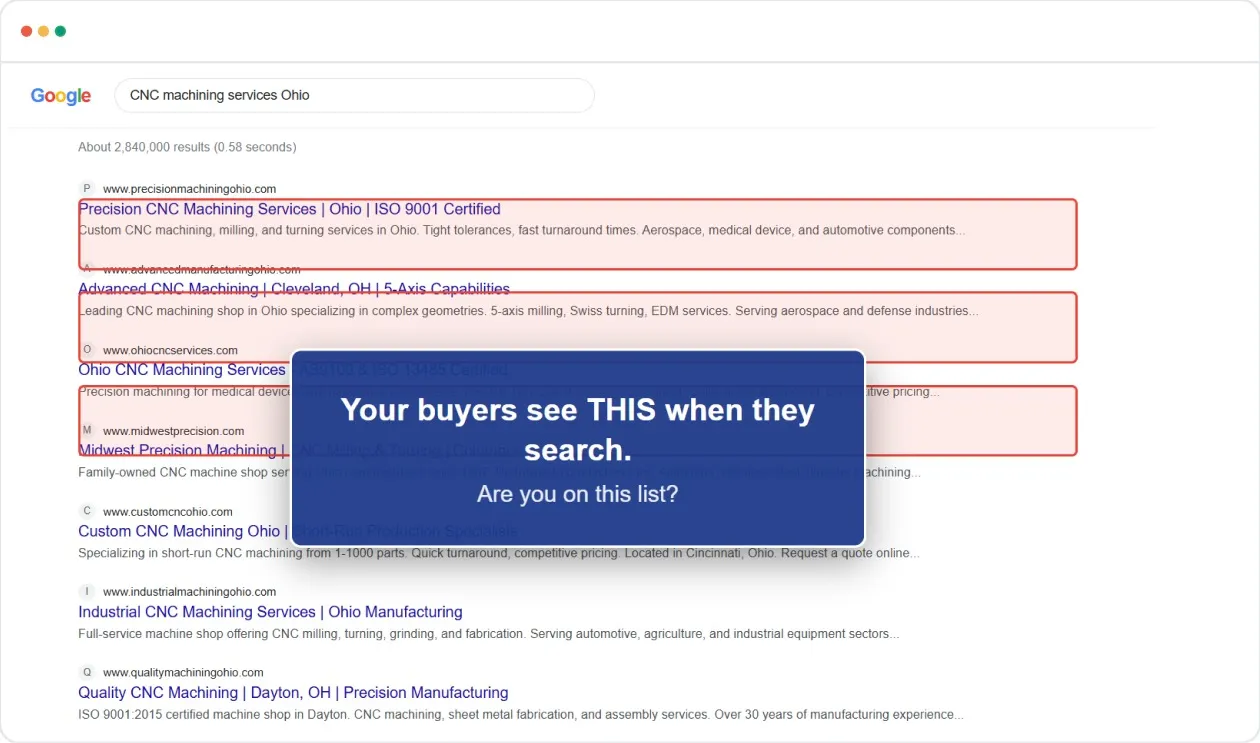
Search Engine Optimization, or SEO, in the manufacturing industry is simple, yet strategic. It’s the process of helping search engines like Google, Yahoo, Safari, and Bing understand what you do so they can show your business to the right people.
Think of it like this: If someone types “custom machining in Ohio,” Google decides which manufacturers deserve to appear first. SEO is how you make sure you’re that manufacturer.
It is like a digital trade show booth, open 24/7 and reaching buyers across the US (and even globally). Every search is a potential buyer walking down the aisle; the goal is to make sure they see your booth first.
Buyer searches on Google → Your site appears → They click on your website → You capture leads.
How Are Manufacturers Doing SEO Using AI?
Watch this snippet of 30 seconds to exactly know how SEO manufacturing in the US is making $$$ in revenue using AI SEO agents.
Why SEO for Manufacturing Matters?
Research shows that 57% of B2B companies say SEO brings in more leads than any other marketing channel.

It is mainly because it provides:
- Credibility and trust: Appearing on the first page signals authority and reliability.
- High-quality leads: Your site attracts decision-makers searching for your exact capabilities.
- Long-term ROI: Unlike paid ads, SEO keeps working even when you stop spending.
- Lower acquisition costs: Organic visibility means more qualified inquiries without recurring ad budgets.
So, how do manufacturers actually achieve these results?
The Two Core Parts of SEO That Drive Online Presence
Think of SEO as two engines driving your digital visibility — one on your website, and one outside it. For industries, both are equally critical because your buyers evaluate you in two stages:
- Can they find you when searching for a specific capability (e.g., precision CNC machining for aerospace)?
- Once they find you, does your website prove your expertise, reliability, and scale?
It comes down to two key parts of SEO working together: On-page SEO and Off-page SEO.
1. On-page SEO: Build a Website That Speaks the Buyer’s Language
On-page SEO covers everything that lives on your website. It’s how you communicate your expertise, not just to potential buyers, but also to Google.
Here’s what to focus on:
- Keyword optimization: The term “keyword” means exactly what your buyers are searching for. Use the exact terms on your website that the buyers use. For instance, “custom stainless steel fabrication”, across titles, headers, and body text.
- Meta tags and descriptions: Every page should have a unique title and meta description (the information you see under a title in Google search) that summarizes what the page offers. This helps search engines (such as Google) index (read) your content correctly.
- Header structure (H1, H2, H3): Organize your content logically. For example, your service page might include headers such as “Capabilities,” “Industries Served,” and “Certifications.”
- Image optimization: Use quality images to improve load times and include descriptive alt text (brief image information)
- Internal linking: Link related pages (e.g., your materials page linking to your product page) to help Google understand your site’s hierarchy.
- Content quality: Create pages that clearly explain your processes, tolerances, and materials. The goal is to become a trusted educational source, not just a vendor.
Good on-page SEO ensures your site communicates value. When Google understands your expertise, it ranks you higher, helping buyers find you faster.
How it impacts your business: A well-optimized site keeps buyers engaged longer, leading to more quote requests and fewer lost opportunities.
2. Off-page SEO: Build Authority Beyond Your Website
Off-page SEO is everything that happens outside your website that boosts your credibility. It tells Google (and your prospects) that you’re trusted across the industry.
Here’s what to focus on:
- Backlinks from credible industry sites: Aim to get featured or listed on authoritative platforms like Thomasnet, MFG.com, Engineering.com, or IndustryNet. Each link acts like a “vote of confidence” for your brand.
- Guest content & thought leadership: Contribute technical articles or case studies to trade publications or associations. This helps you earn both links and recognition.
- Online reviews: Encourage satisfied clients to leave positive reviews on Google Business Profile and industry directories.
- Social signals: Sharing updates, certifications, or project photos on LinkedIn and other professional platforms helps reinforce your brand’s legitimacy.
- Mentions without links: Even when a site mentions your company name without linking, it still counts as a credibility signal in Google’s eyes.
Search engines view backlinks and brand mentions as proof of reliability. The more trusted websites vouch for you, the more confidence Google and your buyers will have in your business.
How it impacts your business: A strong off-page SEO profile helps your website rank for competitive industry keywords like custom injection molding or ISO-certified sheet metal fabrication.

When both on-page and off-page SEO work together, your website doesn’t just rank — it becomes a trusted website for buyers searching online.
Read about the Best Platforms for SEO for Manufacturing
How to Start SEO for Manufacturers (The Practical Way)
SEO for industrial companies takes time to work. It helps Google understand your website better and show it to the right buyers. Here are some of the top online manufacturers' SEO strategies that compound over time:
1. Start With The Foundation: Your Website
Most manufacturing websites were built years ago and have never been touched since. But your homepage is the first thing buyers and Google look at; it’s your digital storefront.
If your site opens with “Welcome to ABC Manufacturing,” you’ve already lost them. Buyers (and Google) need clarity right away:
“Custom Automotive Parts Manufacturer | ISO-Certified Products in Michigan.”
That one line instantly tells both humans and search engines what you make and where you’re based.
Once that’s clear, make sure your website loads quickly, looks fine on mobile, and feels modern, because a slow, outdated site sends a signal that your business might be too.
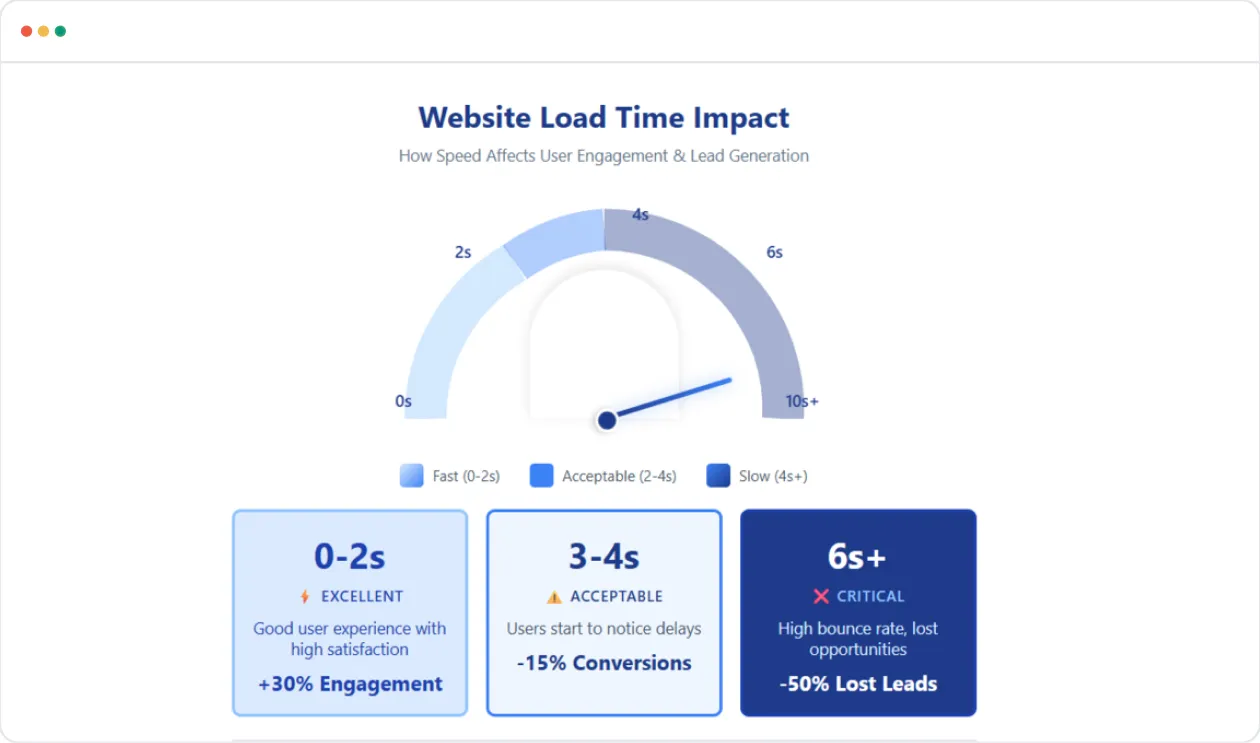
In manufacturing, your buyers judge credibility fast. If your site loads slowly or looks broken on mobile, they won’t wait; they’ll find another supplier who looks more reliable online.
A slow website can also kill leads faster than poor pricing.
Use tools like Google Analytics or GTmetrix to check load times, mobile experience, and performance suggestions. Even a 1–2 second improvement in page load can keep buyers on your site longer and help you rank higher.
Google primarily uses your mobile site when determining rankings. That means your pages need to look and work perfectly on phones and tablets, not just desktops. If a buyer struggles to navigate your site on their phone, your ranking suffers, and so do your leads. This is one of the best SEO solutions for manufacturing.
2. Speak Your Buyer’s Language
Earlier, we covered how on-page SEO helps Google and your buyers understand your website. This is where speaking your buyer’s language takes it to a level deeper. It’s about aligning your keywords with what real buyers actually search for.
Here’s where most manufacturers get it wrong.
You describe your services using technical or branded terms, “precision-engineered polymer solutions,” while your buyers search for “plastic injection molding company in Ohio.”
If your SEO content for manufacturers differs, that’s a significant mismatch.
Do this quick exercise:
- Open your inbox or RFQ tracker.
- Pick 3-5 recent quote requests or buyer inquiries.
- Highlight the exact words they use to describe your service. (Example: Can you please share details on “CNC machining for aerospace parts,” “custom sheet metal fabrication in Texas.”)
- Now, check your website. Are those exact phrases anywhere on your pages?
If not, that’s your first SEO fix.
Why it works: Those buyer-used phrases are your most valuable keywords. They’re real, proven, and directly connected to purchase intent. Once you start using them naturally across your site, Google and buyers both recognize what you truly offer.
3. Show Depth, Not Just Presence
Don’t hide everything under a single “Services” tab. If you do CNC machining, sheet metal fabrication, or injection molding, each deserves its own page.
Why?
Because when a buyer searches for “CNC machining aerospace parts,” Google wants to send them to a page that proves you know that specific work, with specs, tolerances, certifications, and even a few photos or project highlights.
Use the Right Content to Show Expertise
Your pages don’t have to be just text.
Think of what buyers want to see: photos of past projects, short demo videos, team introductions, or case studies showing capabilities.
Blogs can answer common buyer questions. These content types not only help Google understand what you offer but also make buyers trust you more.
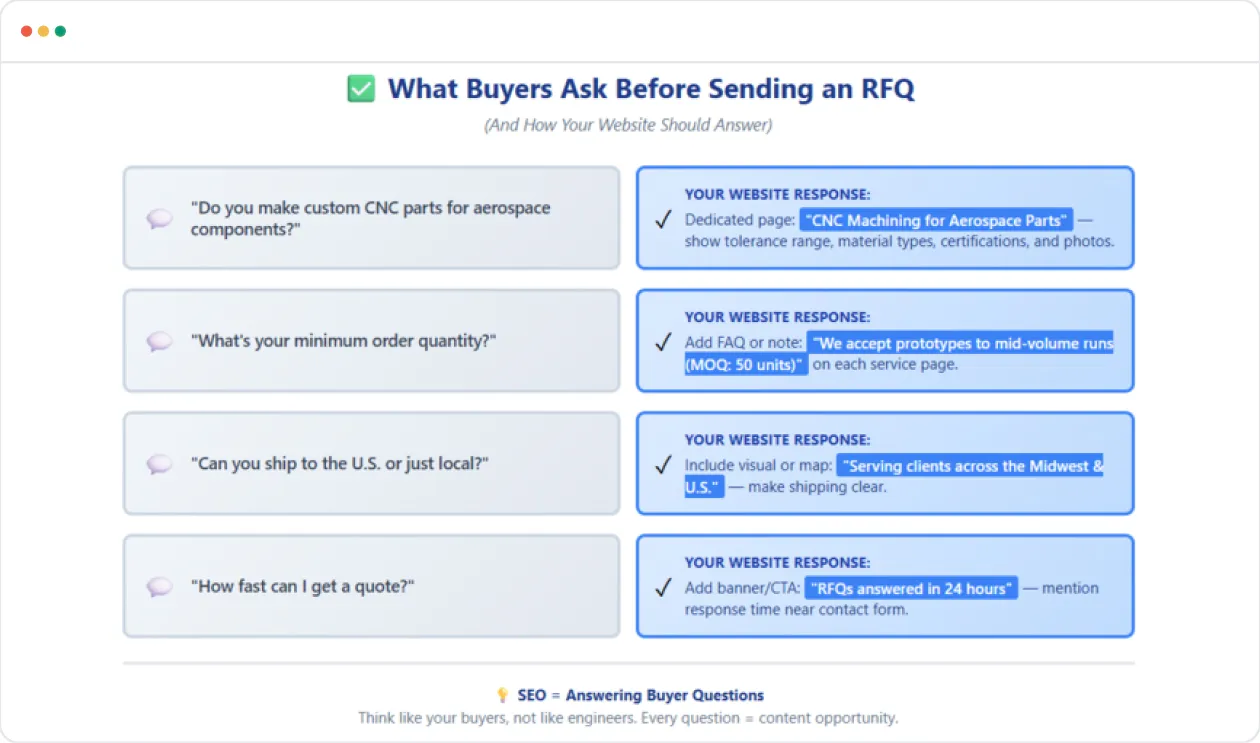
The more helpful and complete your pages are, the more Google trusts you.
4. Get Credibility From the Right Places
You’ve probably seen marketing blogs talk about “backlinks.”
Backlinks simply mean other trusted sites mentioning or linking back to you, and Google takes that as proof you’re legitimate.
Backlinks aren’t the only credibility signal. Reviews on Google, industry directories, and even LinkedIn recommendations matter. Encourage satisfied clients to leave feedback. Positive reviews make your business more visible and trustworthy, which directly influences leads.
How Trustworthy Is Your Online Presence?
- Is your Google profile updated? If yes, how often do you update it?
- Do you have at least 3 client reviews?
- Are your certifications visible on your site?
- Do your partners link back to you?
- Have you published any case studies?
A few solid mentions on those sites can do more for your credibility than hundreds of random backlinks from unrelated sites.
5. Don’t forget Local Searches (“Near me” searches)
Most buyers prefer working with manufacturers nearby. That’s why local SEO matters more than you’d think.
Beyond your Google Business Profile, ensure your company is listed consistently across industry directories like Thomasnet, MFG.com, or your local chamber of commerce. Keep your NAP (name, address, phone) identical everywhere.
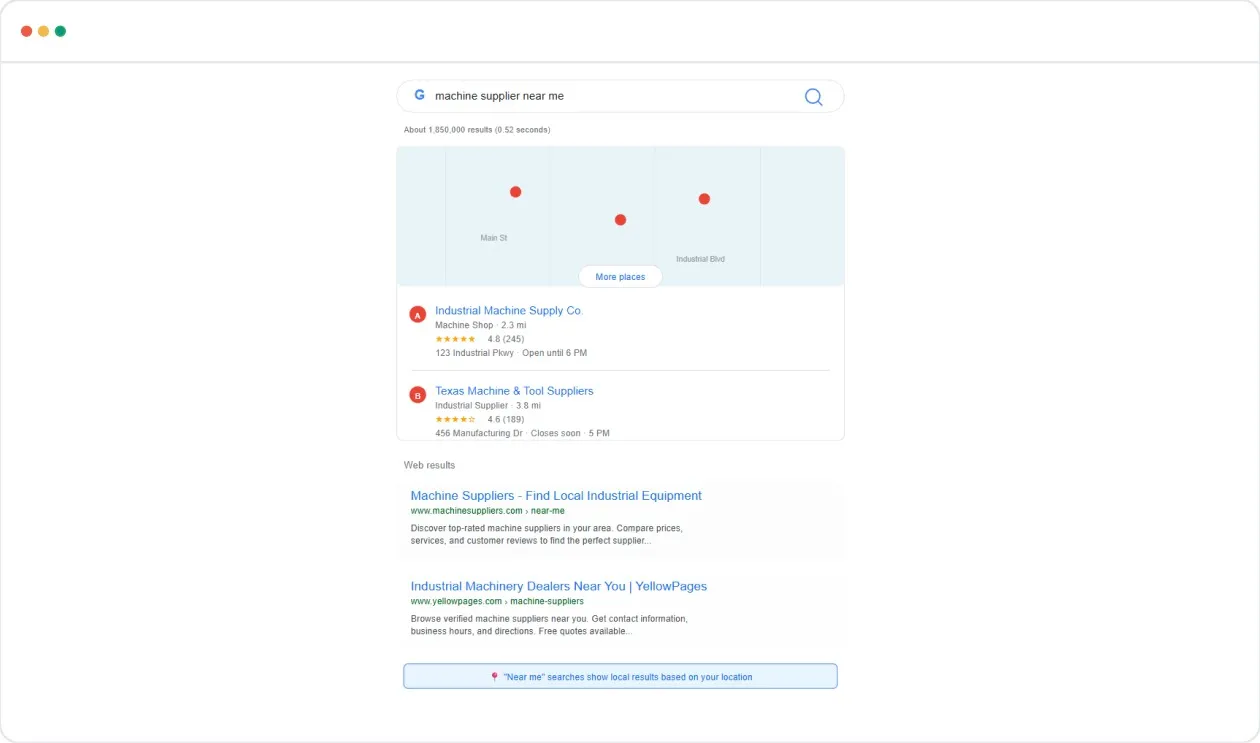
You’re not just helping Google here. You’re helping the next buyer who wants to find someone like you but doesn’t know you exist yet.
6. Track What’s Working (and What’s Worth Your Effort)
SEO is not set-and-forget.
Use free tools like Google Search Console. It tells you what people searched before landing on your site, which pages get the most visits, and what’s leading to quote requests or calls.
SEO isn’t just about traffic on your website; it’s about real business results. Track which keywords bring visitors, which pages lead to RFQs, and how your visibility grows over time.
Even a small boost in leads can justify months of effort, and over time, SEO continues working—unlike paid ads that stop the moment you stop paying.
When you put all of this together (clarity, credibility, and consistency), SEO stops sounding too techy and becomes a lead engine.
What Success Should Look Like (Track These 3 KPIs)
- Website traffic: Are more buyers visiting your site?
- Quote requests: Are your contact or RFQ forms getting more submissions?
- Keyword rankings: Are you showing up higher for the terms your buyers actually search for?
You’re not trying to “beat the algorithm” here. You’re just explaining your work in a way Google understands and buyers can find.
Once your basics are in place, it’s time to step up your game. This is where a few advanced SEO moves can help you stay ahead of competitors and keep your rankings strong for years.
Advanced SEO Strategies for Manufacturers
Once your basics are in place, your website is clear, fast, and showing up for the right searches, you can go one step further.
This is where a few advanced manufacturing SEO strategies can help you stay ahead of your competitors and keep your rankings strong for years.
1. Help Google Understand Your Products with Schema Markup
Now, schema markup sounds highly technical. But it isn’t too difficult for you to achieve. It is like adding labels and part numbers (basically, precise details) to your web pages.
“Think of Schema Markup as a Spec Sheet for Google.”
It tells Google exactly what your content is, whether it’s a product, service, or customer review.
For example, if you sell custom aluminum parts, you can add a “Product page with specs, pricing, capabilities, etc,” so Google knows that page shows a product, not just text.
When done right, this helps your pages appear with extra details, directly in search results. That means more visibility, more clicks, and more credibility.
Technical SEO Checklist
Make sure your site ticks all these boxes:
- HTTPS secured (buyers trust secure sites)
- XML sitemap updated (helps Google read your pages)
- Schema markup (precise info) for all products and services
- No broken links or 404 errors
- Fast loading (< 3 seconds) on all devices
Get an expert review of what’s slowing your SEO performance. Talk to us here.
Once your website is technically sound, it’s time to see how you compare to yourself in the market.
2. Use AI to Spot What Your Competitors Are Ranking For
Here’s where technology can actually save you time.
Instead of spending hours figuring out what to write or where your site is missing keywords, AI Agents can analyze competitor websites, keywords your buyers are searching for, and page load time – all in minutes.
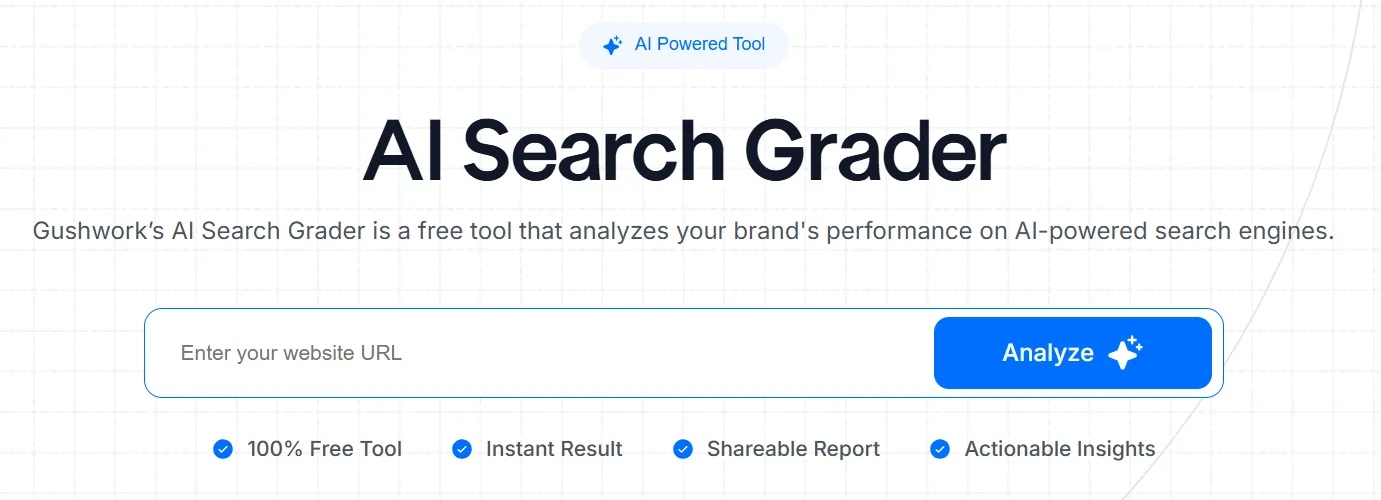
You don’t need to guess what to post; AI can help you decide what will actually bring more RFQs. It’s like having a digital analyst quietly map your entire market, showing you which areas to target so you can attract more RFQs without guesswork.
3. Support SEO with Paid Ads
Once you know what buyers search for, it’s time to scale.
SEO takes time, but paid ads can give your website an instant visibility boost while your organic rankings build up. When used together, they make sure your brand shows up in both paid and organic search results — doubling your exposure to buyers.
Remember, paid ads work best when you already have some visibility and need to promote new launches or announcements.
Relying only on paid ads isn’t sustainable, they stop the moment you stop spending, while SEO continues to deliver leads long after.
Here’s how to do it right:
- Target high-intent keywords: Run ads for the same phrases your SEO is targeting (e.g., “custom metal fabrication Michigan”). This helps you appear on top while your SEO pages climb organically.
- Use ads to test messaging: Track which ad headlines and descriptions get the most clicks. The best-performing copy can guide your website’s SEO content.
- Retarget past visitors: Paid ads can re-engage engineers or procurement managers who visited your site but didn’t submit an RFQ.
- Balance your spend: Use paid campaigns to fill short-term lead gaps while SEO builds long-term traffic.
- Use a clear landing page: Create a landing page/redirect your readers with the right information when they click. Take them through a journey until they fill out a form.
When your SEO, content, and paid ads start working together, you’ll notice your visibility improving and more qualified buyers visiting your site. Eventually, giving you leads.
How Long Does SEO for a Manufacturer Take to See Results?
Here’s the part every manufacturer wonders about: how long should I wait to see results?
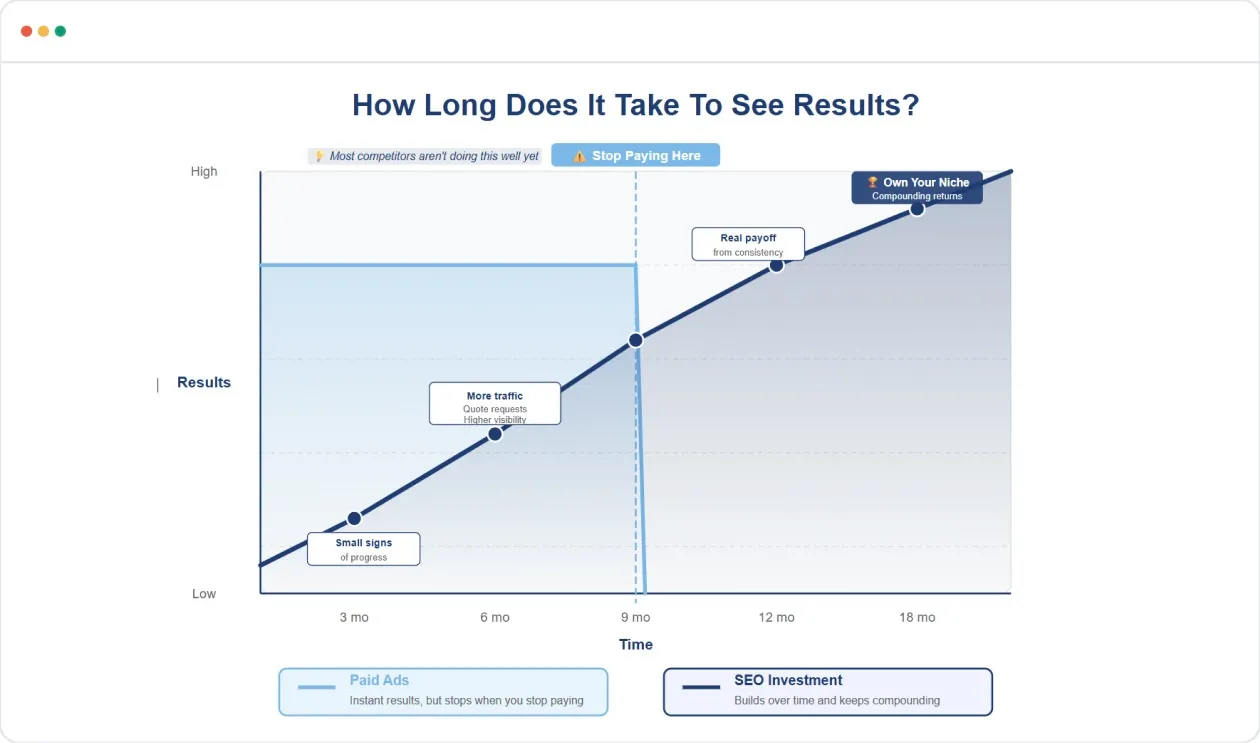
Most manufacturers start seeing progress in 3–6 months. More pages, more visitors, more quote requests.
Remember, SEO compounds. Every update strengthens your authority, and the sooner you start, the sooner you pull ahead of competitors still waiting for referrals.
And here’s the best part: Most of your competitors aren’t doing this well yet. So if you start now and stay consistent, you could own your niche on Google before they even realize what happened.
Pro Tip: There are AI SEO Agents in the market that can do 6 months of content and SEO in just 4 weeks. Many manufacturers in the US already have found 30+ leads in 3-4 months using AI platforms.
Success in SEO isn’t just about doing more. It’s about doing it right. Many manufacturers unknowingly make small mistakes that undo months of progress.
Common SEO Mistakes Manufacturers Make
Even experienced manufacturers who have tried SEO fall into a few traps. These aren’t technical errors that they make, but just blind spots that quietly block your visibility.
1. Hiding Everything Under One ‘Services’ Page
If you list all your capabilities (machining, molding, fabrication, finishing) on one page, Google can’t tell which one to show for a specific search.
So when someone searches “sheet metal fabrication Ohio,” you disappear.
Fix: Give each service its own page, with clear titles, specs, certifications, and even sample projects. It shows depth, and Google rewards expertise.
2. Ignoring Local SEO (“near me” Searches)
Most buyers prefer working with manufacturers nearby. But if your Google Business Profile (Your business listing on Google) is outdated or your address appears differently across directories, you’re invisible in local searches.
Fix: Keep your NAP (name, address, phone) consistent across your website, Google profile, and directories. Add phrases like “CNC machining in Michigan” naturally into the text on your website, especially on your homepage, service pages, and about section.
3. Chasing Cheap Backlinks Instead of Real Credibility
Many “SEO packages” promise hundreds of backlinks for cheap prices (Yes, you have to pay for other sites to link to your articles), but those links often come from spammy, irrelevant sites.
For manufacturers, it’s not about volume, it’s about authority.
Fix: Get listed on trusted industry platforms like Thomasnet, MFG.com, or your local chamber of commerce. One solid mention there can outweigh 50 low-quality links.
4. Treating SEO as a One-Time Project
SEO isn’t a campaign you check off. It’s an ongoing part of how your business stays visible online. SEO takes time. It takes 6 months to 1 year to show real results. But it is sustainable and compounding. Once it starts showing results, it gives you leads for 2-3 years.
If you stop updating your pages, checking site speed, or publishing new capabilities, your rankings slowly slip.
Fix: Review your site quarterly. Check what’s ranking, what’s slow, and what’s outdated. Even minor improvements add up.

Avoiding these mistakes alone can put you ahead of 80% of your competitors. Most of whom are still treating SEO like an afterthought rather than an ongoing growth channel.
How SEO Works Across the Manufacturing Industry (From Strategy to Execution)
SEO for manufacturers is not a single tactic—it’s a system that adapts across industries, buyer stages, and markets.
Whether you’re exploring industrial marketing agencies or evaluating industrial SEO services, the fundamentals stay consistent while execution varies by complexity.
Manufacturing SEO vs Industrial SEO: What Changes?
Manufacturing SEO focuses on product-led searches, applications, certifications, and buyer education. SEO for industrial companies adds layers like distributor visibility, regional demand, and specification-driven content. Both rely on manufacturing search engine optimization, but industrial SEO often requires a more robust technical infrastructure and greater authority.
What a Manufacturing SEO Strategy Must Cover
A strong manufacturing SEO strategy aligns content, site architecture, and search intent. This includes:
- SEO for the manufacturing industry across products, use cases, and comparisons
- Manufacturing search marketing that supports long buying cycles
- Content designed for engineers, procurement teams, and operations leaders
This is why manufacturing company SEO differs from generic company SEO.
When to Work With an SEO Agency or Consultant?
A manufacturing SEO consultant supports audits and strategy, while a manufacturing or industrial SEO agency executes at scale. Growing manufacturers often partner with manufacturing SEO companies for content, technical, and international SEO as demand expands.
How to Scale SEO Across Markets and Industries?
As manufacturers grow, industrial SEO and search marketing become critical—especially for global reach. At this stage, manufacturing SEO agencies must support technical content, regional intent, and industry-specific competition.
- Standardize your SEO foundation: Build a repeatable manufacturing SEO structure covering technical SEO, core pages, and content templates before expanding into new industries or regions.
- Localize search intent by market: Adapt keywords, terminology, and use cases for each geography or industry segment, especially for industrial SEO and international SEO for manufacturers.
- Expand content by application, not products: Scale manufacturing search marketing by targeting real-world applications, specifications, and buyer problems across industries.
- Strengthen authority with internal linking: Connect related manufacturing SEO pages to signal topical depth and relevance across markets.
Measure revenue signals, not just rankings: Track qualified leads, inquiries, and conversions to ensure SEO for manufacturing companies scales profitably, not just visibly.
Here’s How A Manufacturing Tech Brand Got 78 RFQs with SEO in 12 Months
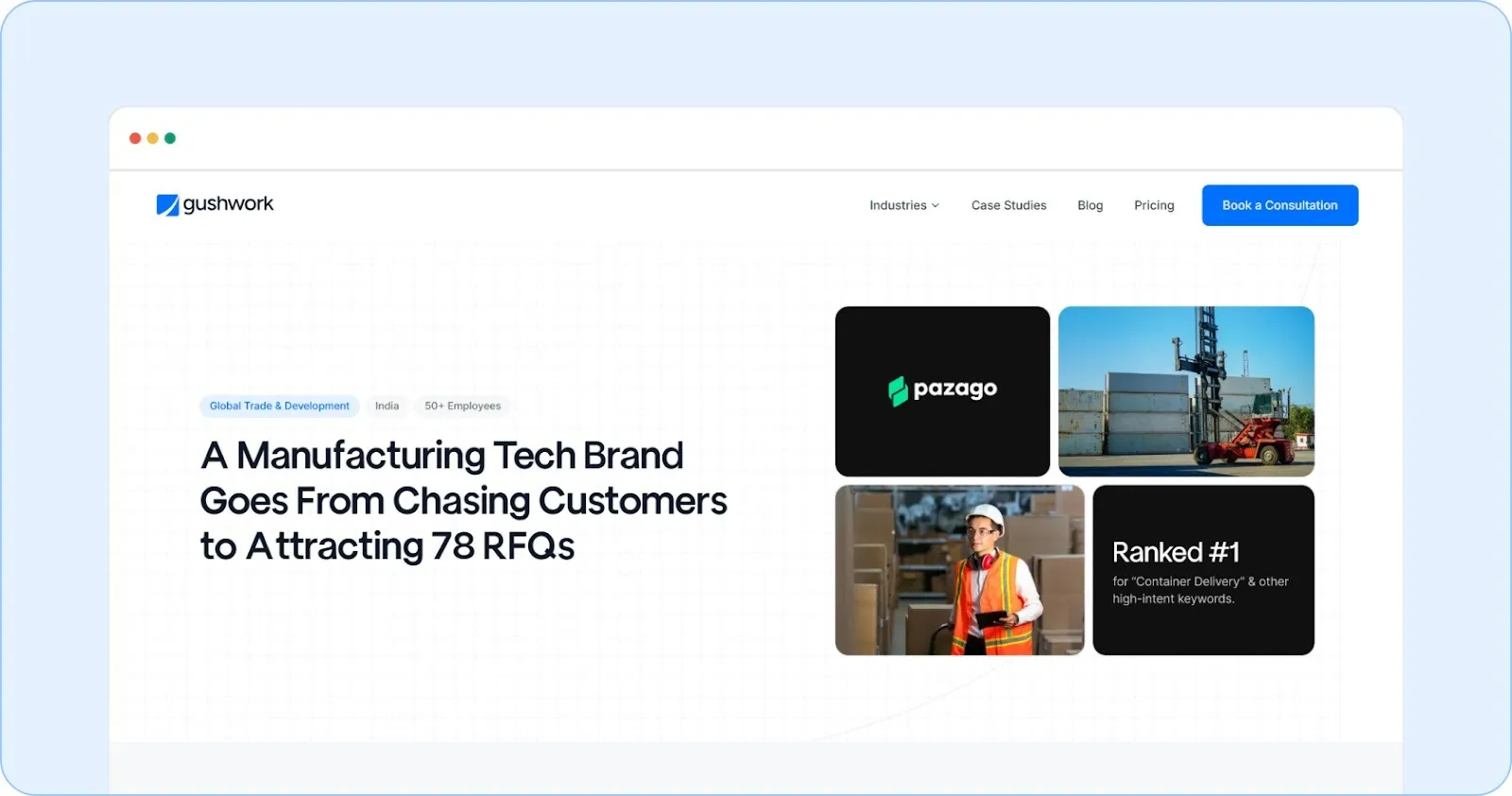
A manufacturing-tech exporter was stuck chasing customers. Then they flipped the script: 78 qualified RFQs in 12 months — zero ad spend.
They ranked in the top 3 for 250+ high-intent keywords, pulled in 12,700+ monthly visitors, and turned websites into lead machines.








.webp)













.webp)
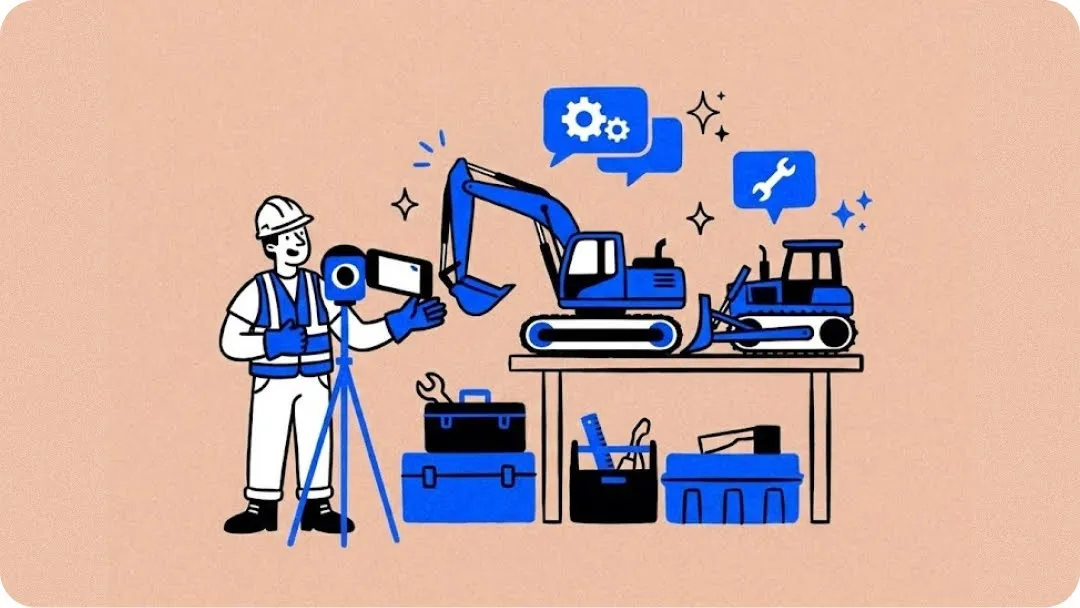







.webp)
.svg)


.svg)
.svg)
.svg)



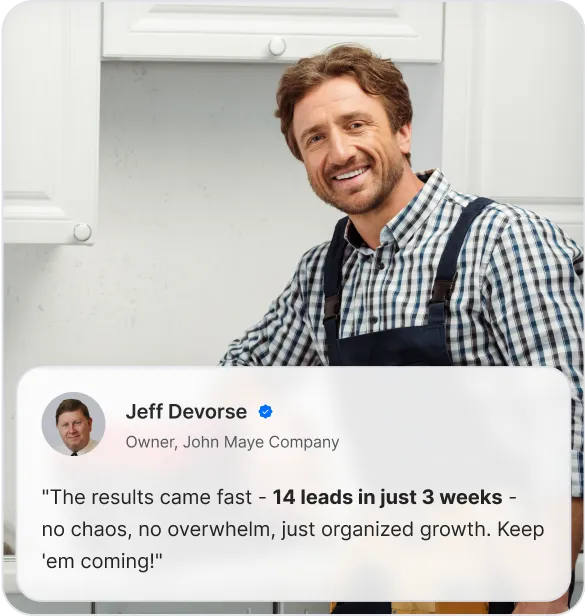
.svg)


